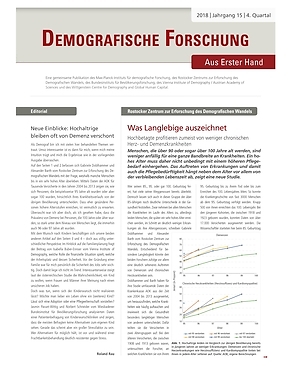December 19, 2018 | Defo News
Oldest old generally have fewer dementia diseases

© Max Planck Institute for Demographic Research
The new issue (No. 4/2018) of Demografische Forschung Aus Erster Hand, the popular science newsletter with latest research results from demography, has been released.
The Newsletter is available in German only.
"Demografische Forschung Aus Erster Hand" is a joint publication of the Max Planck Institute for demographic Research (MPIDR), the Rostocker Zentrum zur Erforschung des Demografischen Wandels (RZ), the Vienna Institute of Demography (VID), the Wittgenstein Centre for Demography and Global Human Capital and the Federal Institute for Population Research (BiB).
The topics of the new issue are:
1. What characterizes the long-lived?
Oldest old generally have fewer chronic heart and dementia diseases
(from the Research Center for the Study of Demographic Change)
People who live beyond 90 or even 100 are less prone to a wide range of diseases. High age thus does not necessarily result in higher need for care. A new study shows that the incidence of illness and thus the need for long-term care largely hinges on the remaining lifespan, next to age.
2. Security and the desire for a child
How job security and financial worries affect family planning
(from the Vienna Institute of Demography)
Whether someone has a child or wants to have one often hinges on job security and financial resources, among other things. People having great difficulty in making ends meet are more likely to postpone family planning. But when we look at job security, a different picture emerges.
3. Stress from fertility treatment
Adoption, foster child or no child at all: Alternatives can reduce stress
(from the Federal Institute for Population Research)
When couples cannot conceive naturally, many of them attend a fertility clinic to receive medical help. But fertility treatment is often associated with considerable stress. Those, however, who can imagine a life without (another) child will have stress levels significantly reduced.
The newsletter is released four times a year and is available electronically and as a printed version and is free of charge.
All past issues are available online on the Newsletter website. On the website you also have the possibility to subscribe to the Newsletter to get informed about the release of the new issues or to receive the printed versions by mail.